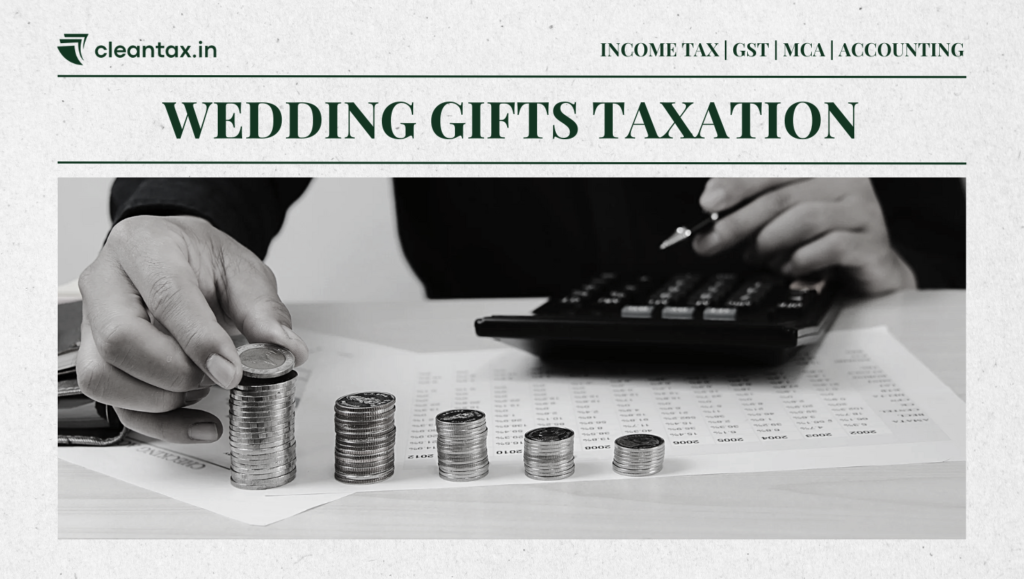Marriage is a celebration of love, joy, and togetherness. Amidst the festivity, couples often receive gifts that symbolize blessings and goodwill. These gifts can range from cash and jewelry to property and art pieces. However, beyond the emotional value, one may wonder about the tax implications under Wedding Gift Taxation laws.
Are they taxable? Do you need to disclose them while filing your Income Tax Return (ITR)? This comprehensive guide dives into the nuances of wedding gift taxation under Section 56 of the Income Tax Act, 1961, to help you understand what is taxable, what isn’t, and how to stay compliant.
What Are the Wedding Gift Taxation Rules?
Wedding Gift Taxation rules provide clarity on exemptions and taxable scenarios. Gifts received by newlyweds on their wedding day are generally exempt from taxation in India. Whether it’s cash, jewelry, property, or stocks, gifts from immediate family members are completely tax-free under Section 56 of the Income Tax Act. Immediate family members include:
- Parents
- Siblings
- Spouses of siblings
Exemption Limits for Non-Family Gifts
While gifts from relatives are exempt regardless of the value, gifts from non-relatives are taxable if their aggregate value exceeds Rs. 50,000 in a financial year. However, gifts specifically exempt under Wedding Gift Taxation laws. are exempt, even if they surpass the Rs. 50,000 limit.
Example:
If your parents gift you Rs. 10 lakh as a wedding gift, it is exempt from tax. Similarly, gifts from friends or colleagues, regardless of their value, are non-taxable when received during your wedding.
Clubbing Provisions for Gifts Received at a Wedding
Wedding Gift Taxation encompasses various scenarios, including gifts received from in-laws and pre-marriage gifts. While wedding gifts are tax-exempt, clubbing provisions under the Income Tax Act may apply in certain cases. Here’s what you need to know:
- Gifts from Parents-in-Law: If a daughter-in-law receives gifts from her in-laws, any income generated from those gifts (such as rent or interest) is clubbed with the income of the in-laws who made the gift.
- Pre-Marriage Gifts: Gifts given to the bride or groom before the wedding, especially by non-relatives, may attract Wedding Gifts Taxation if they exceed Rs. 50,000. Gifts from in-laws before the marriage are exempt from clubbing provisions but may still be scrutinized if they involve substantial amounts.
- Change in Asset Form: If a gifted item changes form—for example, a painting sold for profit—the resulting income or capital gain will be taxable in the hands of the original donor.
Different Types of Wedding Gifts and Their Tax Implications
Wedding gifts can take many forms, and it’s essential to understand their treatment under Wedding Gift Taxation guidelines:
Movable and Immovable Property
- Land and Buildings:Immovable properties gifted during weddings are exempt from tax, but future income or capital gains from these properties are taxable.
- Jewelry and Artifacts:These include ornaments or utensils made of gold, silver, or platinum, as well as paintings and sculptures.
Cash and Securities
- Gifts in the form of cash, shares, or bonds are tax-exempt if received on the wedding occasion.
Cash and Securities
- Electronics, vehicles, and furniture are also exempt, but proper documentation is essential to prove their source.
Who Qualifies as a Relative Under the Income Tax Act?
Understanding the definition of “relatives” is crucial since gifts from relatives are tax-free without any monetary limit. The Income Tax Act defines relatives as:
- Spouse of the individual
- Siblings of the individual
- Siblings of the spouse
- Siblings of either parent
- Lineal ascendants or descendants of the individual or their spouse
- Spouses of the above categories
- Any member of a Hindu Undivided Family (HUF) to which the individual belongs
Income Accrued from Gifts
Income derived from gifts is a critical aspect of Wedding Gift Taxation to consider. While the gifts themselves are exempt, any income generated from these gifts becomes taxable. For example:
- Rental Income: If a house is gifted and later rented out, the rental income is taxable under “Income from House Property.”
- Capital Gains: If a gifted asset such as land or jewelry is sold, the capital gains arising from the sale are taxable.
Example:
A couple receives a house as a wedding gift and rents it out for Rs. 30,000 per month. The rental income of Rs. 3,60,000 per annum is taxable.
Penalty for Non-Disclosure of Taxable Gifts
Failure to adhere to Wedding Gift Taxation guidelines can result in severe penalties. If you fail to report taxable gifts in your ITR, the penalty can be up to three times the tax owed on those gifts. To avoid such penalties, ensure:
- All gifts exceeding Rs. 50,000 in value (except those exempted) are disclosed.
- Proper documentation, including receipts or acknowledgment letters, is maintained for high-value gifts.
The Proposed Bill to Tax Lavish Weddings
In 2016, the government proposed the Marriages (Compulsory Registration and Prevention of Wasteful Expenditure) Bill. While not yet enacted, the bill aimed to:
- Limit the number of guests and dishes served at weddings to curb excessive spending.
- Impose a 10% tax on wedding expenses exceeding Rs. 5 lakh, with the funds earmarked for underprivileged girls’ weddings.
Although the bill hasn’t been implemented, it reflects growing concerns about extravagant weddings and their societal implications.
Conclusion
A proper understanding of Wedding Gift Taxation ensures compliance and prevents potential financial penalties. Wedding gifts are a beautiful tradition that symbolizes love and support. While most gifts are exempt from taxation, understanding the nuances of tax laws under Section 56 of the Income Tax Act ensures compliance and peace of mind. Whether it’s documenting high-value gifts or being mindful of income generated from them, a proactive approach can help you navigate these rules effortlessly. As you embark on your marital journey, ensure your financial records are as seamless as your celebrations.
For More Information:
Here are some blogs and resources related to wedding gift taxation in India that provide additional insights into the topic:
- Wedding Gifts and Their Tax Implications in India - Fincart
- This blog explains the Wedding Gift Taxation under Section 56(2)(x) of the Income Tax Act, covering exemptions, liabilities, and nuances like capital gains tax and record-keeping.
- Key highlights include the tax-free status of wedding gifts and examples illustrating tax liability.
- Source: Fincart
- Decoding Wedding Gift Tax: What You Need to Know - Ahuja & Ahuja
- This article provides examples to clarify tax liability on wedding gifts, emphasizing exemptions for gifts received during weddings and the importance of documentation.
- Source: Ahuja & Ahuja
- Income Tax on Marriage Gifts - Tax2Win
- This guide discusses the taxation of various types of wedding gifts, such as cash, property, jewelry, and securities, with a focus on exemptions under Section 56 of the Income Tax Act.
- Source: Tax2Win
- What is Gift Tax in India? | Exemption and Rules - Groww
- This blog provides a detailed breakdown of gift taxation rules in India, including thresholds for non-relatives and exemptions for relatives.
- Source: Groww
FAQ's Related to Wedding Gift Taxation
𝐀𝐫𝐞 𝐚𝐥𝐥 𝐰𝐞𝐝𝐝𝐢𝐧𝐠 𝐠𝐢𝐟𝐭𝐬 𝐭𝐚𝐱-𝐟𝐫𝐞𝐞 𝐢𝐧 𝐈𝐧𝐝𝐢𝐚?
According to the wedding gift taxation laws Gifts received on the occasion of a wedding are generally tax-free under Section 56 of the Income Tax Act. However, income generated from such gifts, like rental income from a gifted property, is taxable.
𝐖𝐡𝐚𝐭 𝐢𝐬 𝐭𝐡𝐞 𝐭𝐚𝐱 𝐢𝐦𝐩𝐥𝐢𝐜𝐚𝐭𝐢𝐨𝐧 𝐢𝐟 𝐚 𝐧𝐨𝐧-𝐫𝐞𝐥𝐚𝐭𝐢𝐯𝐞 𝐠𝐢𝐟𝐭𝐬 𝐜𝐚𝐬𝐡 𝐞𝐱𝐜𝐞𝐞𝐝𝐢𝐧𝐠 ₹𝟓𝟎,𝟎𝟎𝟎 𝐝𝐮𝐫𝐢𝐧𝐠 𝐚 𝐰𝐞𝐝𝐝𝐢𝐧𝐠?
Gifts from non-relatives exceeding ₹50,000 are taxable under normal circumstances. However, if received specifically on the occasion of a wedding, they are exempt from tax, regardless of the amount.
𝐃𝐨 𝐈 𝐧𝐞𝐞𝐝 𝐭𝐨 𝐫𝐞𝐩𝐨𝐫𝐭 𝐰𝐞𝐝𝐝𝐢𝐧𝐠 𝐠𝐢𝐟𝐭𝐬 𝐰𝐡𝐢𝐥𝐞 𝐟𝐢𝐥𝐢𝐧𝐠 𝐦𝐲 𝐈𝐧𝐜𝐨𝐦𝐞 𝐓𝐚𝐱 𝐑𝐞𝐭𝐮𝐫𝐧 (𝐈𝐓𝐑)?
Tax-exempt wedding gifts do not need to be reported in your ITR. However, any taxable income generated from such gifts, like interest or capital gains, must be disclosed.


